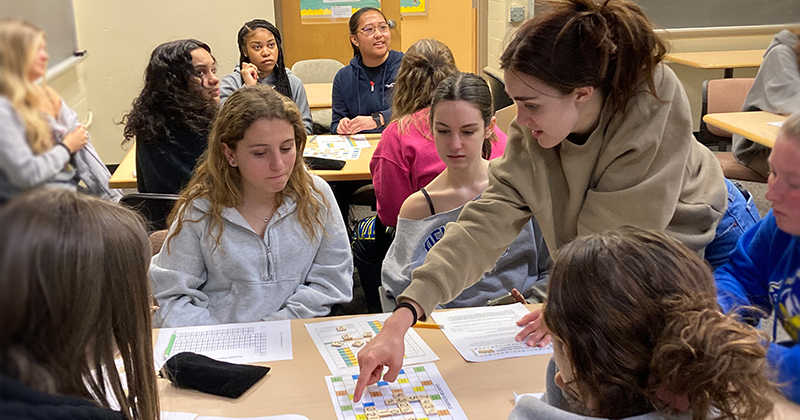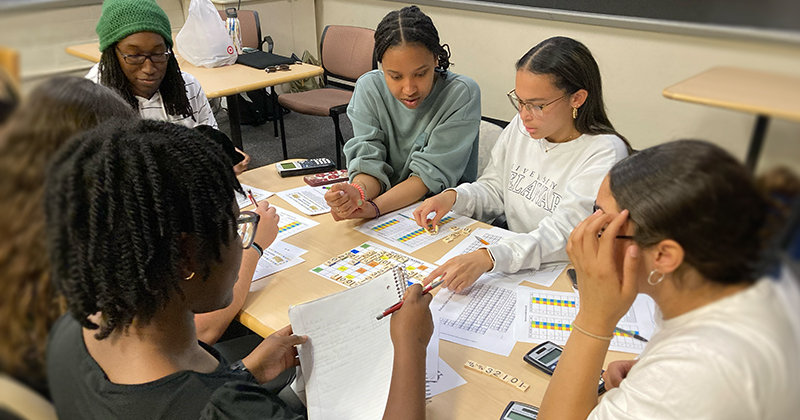


Game-based learning
Photos provided by Lauren Genova October 11, 2024
UD senior explores how gamification can help students understand quantum numbers
EDITOR’S NOTE: Every year, hundreds of undergraduates at the University of Delaware dig into research under the guidance of a faculty mentor. Such experiences provided by UD — a nationally recognized research university — can be life-changing, introducing young scholars to a new field of interest, perhaps even their future career path, as they uncover new knowledge. Our spotlights offer a glimpse into their world.
If you’ve ever told a toddler you were going to time them to see how quickly they could clean up their toys, then you understand the premise of turning something tedious into something fun.
Gamifying is a term that can have this meaning, though the Merriam-Webster definition clarifies this, defining it as “the process of adding games or game-like elements to something (such as a task) so as to encourage participation.”
This idea works with learning, too. University of Delaware wildlife ecology major Jillian Fader, a Wilmington, Delaware, native now residing in Ellendale, is exploring how board games can facilitate chemistry students’ understanding of quantum numbers.
Quantum numbers are like unique postal addresses for each electron in an atom. They tell researchers where an electron is likely to be found within an atom and how the electron behaves. Understanding quantum numbers is essential for chemistry students to grasp more advanced topics, such as how electrons are configured, how atoms bond together to form molecules and what is known as periodic trends, a term used to describe predictable patterns found in the properties of elements that occur due to an element’s position on the periodic table.
Fader, who also has a biology minor, is conducting the chemistry education research with Lauren Genova, assistant professor of chemistry and biochemistry, using a board game the pair developed and piloted in Genova’s CHEM 103 (General Chemistry I) class last spring. Fader is analyzing data collected to ascertain how gamification of complex topics can increase student understanding.
Why did you want to pursue this? What intrigues you about the topic?
Fader: I loved Dr. Genova’s chemistry class when I took it, so I knew I wanted to get involved with research for this class in any way. Dr. G does a lot of work in game-based learning, where her team creates innovative games to help students become more familiar and confident with difficult chemistry topics. One topic that introductory chemistry students often struggle with is quantum numbers. When we started talking about how to incorporate quantum numbers into a physical game, I got really excited about the possibilities of this project. We originally developed a basic card game as a foundation. Then, as we talked among our collaborators, Dr. G had the idea for a quantum number board game, where students could lay down tiles featuring numbers to represent a quantum number set. The game now includes bonus challenges, extra credit and more, while breaking down the concept of quantum numbers in such a fun and engaging way! Being a part of the creative process has been such an amazing opportunity.
Why does research like this matter?
Fader: Research like this helps students achieve a deeper understanding of the course material, and it can enable students to enjoy learning chemistry and motivate them to take higher-level chemistry or STEM (science, technology, engineering and mathematics) courses. For many students, CHEM 103 (General Chemistry I) is the first chemistry course they will take at UD, and their experience in this class shapes their perspective on taking more advanced classes later in their undergraduate career. A positive experience in general chemistry may give students confidence going into harder courses—as well as the motivation to continue—whereas a negative experience may deter them completely. If other professors in different universities play this same game with their class, it can positively affect their students’ confidence in learning chemistry, too.
What’s the coolest thing about being involved in this project? Have you had any surprising or especially memorable experiences?
Fader: The coolest thing about this project is how creative the students get when playing the game, and how clever they are with figuring out how to score the greatest number of points. One of the most memorable games occurred when a student created a valid quantum number set, but selected a value for her angular momentum quantum number that doesn’t correspond to any element on the periodic table but is technically not ‘wrong’ via the relationship of quantum numbers. She had landed on a ‘name the element’ space, so since she couldn’t name the element for this quantum number set, she created her own element, which she named after herself: “Allysium.” She was so excited to name her element, and that was very inspiring to me. I remember feeling so happy that some students genuinely enjoyed the game so much.
Is there anything you've discovered about yourself and your career goals as you've worked on the project?
Fader: I really enjoy helping people understand complex topics in a more simple, hands-on way. I’ll continue to try to do that in my time at UD and throughout my pre-med journey. If I can help create a simple game to illustrate the relationship between quantum numbers, then I can use the knowledge I gained here to “gamify” other difficult topics that I learn farther down the road. This will continue to motivate me in my academic journey and hopefully help others.
What do you enjoy doing in your spare time?
Fader: In my spare time, I am a research assistant in the lab of Austin Keeler, assistant professor of biological sciences, which focuses on understanding sensory systems related to pain and touch. I love the process of learning through research and getting hands-on experience in the lab. I also enjoy traveling, staying physically active and spending time with family and friends.

Contact Us
Have a UDaily story idea?
Contact us at ocm@udel.edu
Members of the press
Contact us at 302-831-NEWS or visit the Media Relations website

